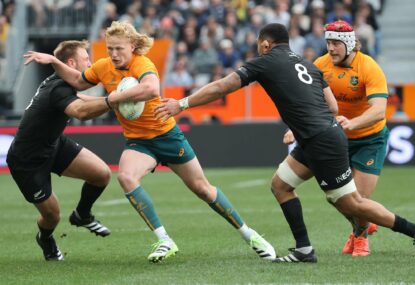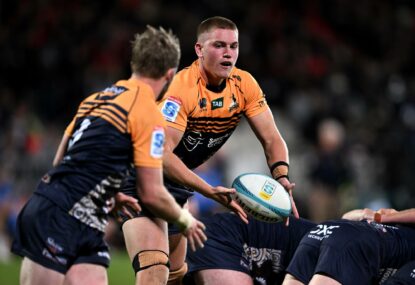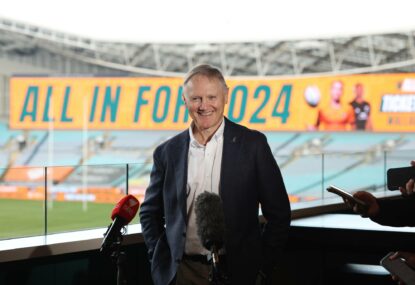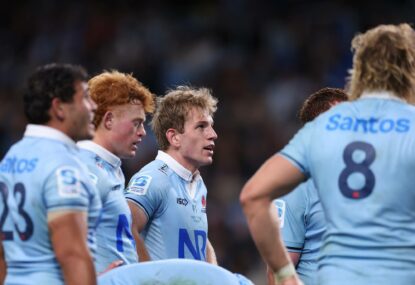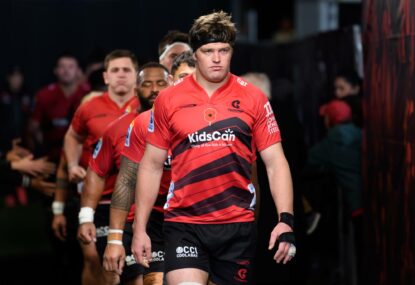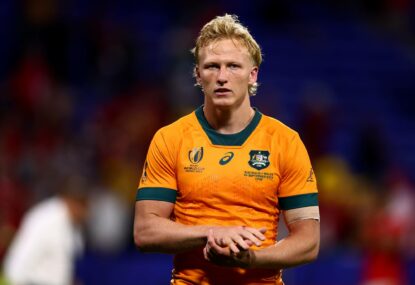Matt Giteau at halfback with an all-NRL midfield of Berrick Barnes, Timana Tahu and Ryan Cross operating outside him. Just one of the many intriguing possibilities rugby fans can look forward to during Robbie Deans’ second season as Wallabies coach.
“If we can build enough depth, it doesn’t matter what number they have on their backs,” Deans said, repeating an oft-stated mantra, after the Wallabies’ season-ending spring tour of Europe.
Deans has no specific plans – not that he is publicising anyway – of being the third Wallabies coach to try the brilliant Giteau at scrumhalf and will continue persevering with talented but erratic Luke Burgess at No.9.
For the time being anyway.
With immense faith in Barnes, though, and well aware that Giteau has the surest pass in the country, Deans refuses to rule out anything as he continues his ongoing search for Australia’s best backline combination.
“There are so many vagaries in the game there’s no point drawing a line in the sand,” Deans says.
The one certainty in 2009 is that Deans will continue blooding fresh talent on the international stage.
After introducing a dozen players to the Test arena in his maiden season, Deans is eager for the likes of NSW centre Rob Horne, Brumbies halfback Josh Holmes, Queensland half Ben Lucas and Brumbies prop Salesi Ma’afu to take the next step.
Indeed, with Sam Cordingley playing out his career in France, Deans says Australian rugby “needs” Holmes to fulfil his potential.
Former Test prop Greg Holmes, following his wretched run with injury, is another player on Deans’ radar, while others potentially in line for a call-up include Waratahs winger Ratu Nasiganiyavi – the tryscoring cousin of Lote Tuqiri – and Brumbies trio Christian Lealiifano, Tyrone Smith and Julian Salvi.
Mindful that senior Wallabies including Tuqiri, skipper Stirling Mortlock, Phil Waugh, George Smith, Nathan Sharpe and Al Baxter – for years now the core of the Test side – will be well into their 30s when the 2011 World Cup comes around, Deans triggered the generational shift the minute he took charge in June.
Significantly, the 12 players who made their Test debuts this season – James O’Connor, Peter Hynes, Cross, Tahu, Lachie Turner, Quade Cooper, Burgess, Richard Brown, David Pocock, Dean Mumm, Ben Alexander and Sekope Kepu – could virtually make up an Australia A side.
Throw uncapped spring tourist Peter Kimlin and injured Queensland lock James Horwill – who had played just one Test prior under Deans’ predecessor John Connolly – and the Wallabies were just a hooker short of fielding an all-rookies Test XV across the season.
Many of the international newcomers, particularly Hynes, Cross, Burgess and Mumm, all maintstays of the Wallabies’ 2008 campaign, will be viewed as leaders when they return to their respective Super 14 sides, further evidence of the depth and growth in Australian rugby that Deans craves.
Encouragingly, the rebuilding and development has not come at a great expense, with the Wallabies’ first season under a foreign coach also yielding results where they matter most in the professional era – on the scoreboard.
Deans’ class of ’08 achieved several milestones in what was officially their busiest Test program on record.
In 14 Tests, the Wallabies notched wins over each of their Big Four rivals – New Zealand, South Africa, England and France – for the first time since Australia’s World Cup-winning season of 1999 and beat each of the Springboks, England and France away from home for the first time ever in a calendar year.
The Wallabies also won five successive Tests for the first time since 2000 and went within an unconverted try of landing their first Tri Nations title in seven years.
There were lowlights too, notably a 53-8 loss to South Africa in Johannesburg, the Wallabies’ heaviest defeat in Test rugby.
But it is what the Wallabies have with Deans, rather than what they lost or missed out on in 2008, that Mortlock says is most important.
“He’s brought a lot of enthusiasm, a lot of positivity and a lot of belief and that’s flowed directly into the team and he’s as excited as the group is about where we’re looking to head in the future,” Mortlock said.
“The skill level has improved and, with that, the confidence is coming.
“But I would say that we are fully aware that we’ve got a lot of improvement left within us and we’re excited about the opportunity that the next year or two has in store for us.
“We feel as though we have started something here.”





























































































